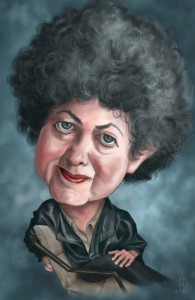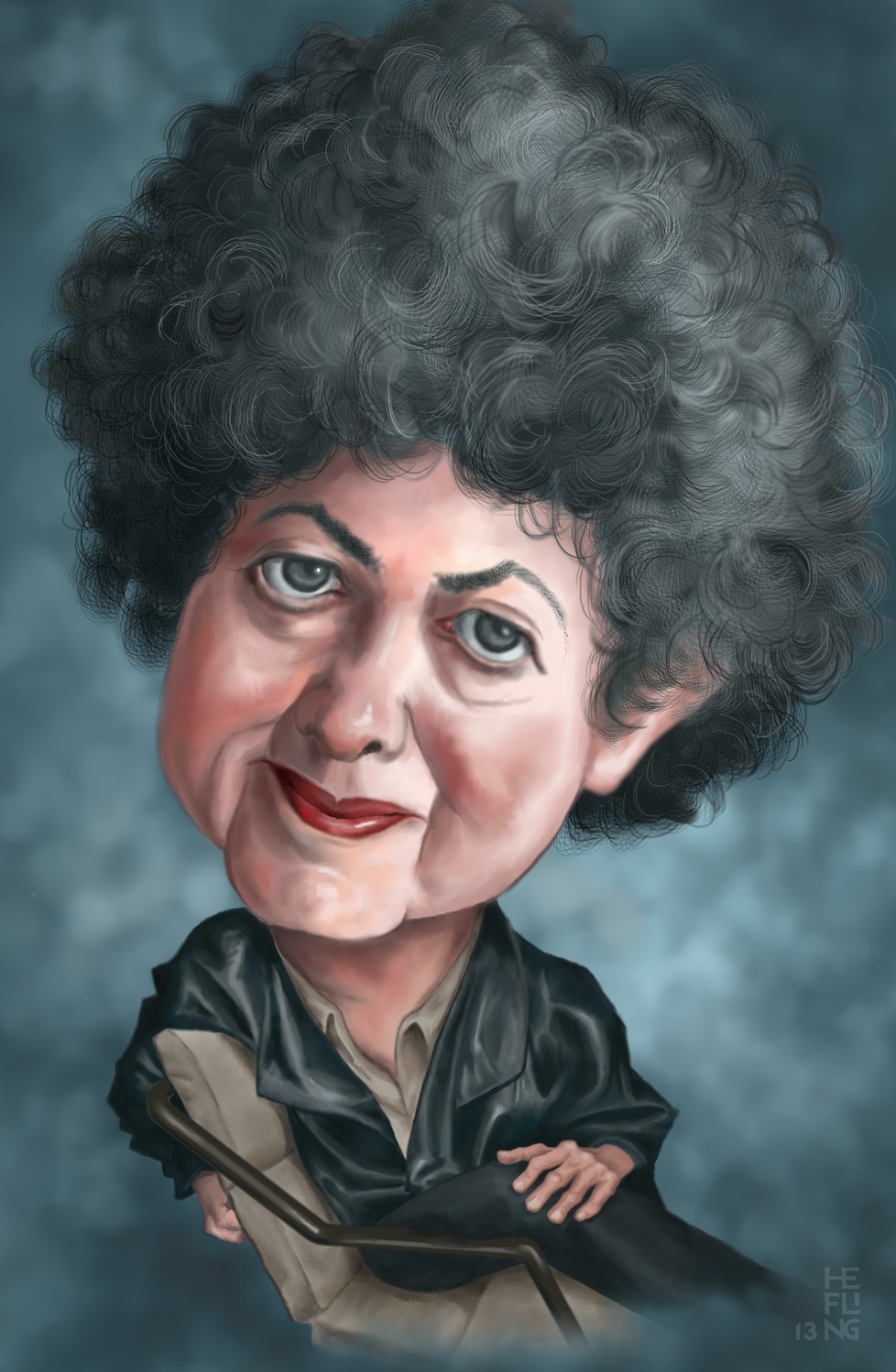Lillian Faderman has devoted her career to rescuing from oblivion  the voices and stories of lesbians and ethnic minorities. Faderman is our great historian, and her books—Surpassing the Love of Men: Romantic Friendship and Love Be- tween Women from the Renaissance to the Present (1981), Scotch Verdict: The Real-Life Story That Inspired “The Children’s Hour” (1983), Odd Girls and Twilight Lovers: A History of Lesbian Life in Twentieth-Century America (1991), To Believe in Women: What Lesbians Have Done For America: A History (1999), and Gay L.A.: A History of Sexual Outlaws, Power Politics, and Lipstick Lesbians (2006)—opened the closet door to the rich, troubled history of lesbians.
the voices and stories of lesbians and ethnic minorities. Faderman is our great historian, and her books—Surpassing the Love of Men: Romantic Friendship and Love Be- tween Women from the Renaissance to the Present (1981), Scotch Verdict: The Real-Life Story That Inspired “The Children’s Hour” (1983), Odd Girls and Twilight Lovers: A History of Lesbian Life in Twentieth-Century America (1991), To Believe in Women: What Lesbians Have Done For America: A History (1999), and Gay L.A.: A History of Sexual Outlaws, Power Politics, and Lipstick Lesbians (2006)—opened the closet door to the rich, troubled history of lesbians.
In 2003, Faderman published Naked in the Promised Land: A Memoir, which ends with her mother’s death. Her new book, My Mother’s Wars, published in March, ends with Faderman’s birth. My Mother’s Wars is the imagined memoir that Faderman’s mother was never able to write. The daughter delves into her mother’s past to tell the story of a Latvian girl who left her village for America with dreams of a life on the stage, only to encounter the realities of her new world: the battles she was forced to fight as a woman, an immigrant worker, and a Jew with family left behind in Hitler’s deadly path. My Mother’s Wars is a riveting chapter in the history of women, as well as Faderman’s poignant, personal tribute to the courage and resilience of her mother.
This interview was conducted by telephone and e-mail last spring.
Mary Meriam: Reading My Mother’s wars is like going to the movies. There is the reality of the newsreels, the fantasy of the movie, and the companion seated next to you, commenting on it all. The newsreels depict the Depression and Hitler; the movie depicts your mother’s love affair with Moishe; and the com- panion is you—comforting, warning, encouraging, and trying to rescue your mother from the reality and the fantasy. This voice, your voice, seems to anchor the book—I found it very moving. For instance, in Chapter Seven you write: “Through infinities of space and years, I watch her. I long for her. I long to tell her what I know: that someday, eons away maybe but as certain as the sun, something to solace her—some small but undeniable something—will be salvaged from all that’s made her suffer. Oh, Mama, would that give you comfort now?” How did it feel to imagine your mother’s life without you in it?
Lillian Faderman: I think that, for all of us, we can only re- member our parents fully shaped and in our service, so it’s a huge conundrum to think of their lives before our life: How could they have existed before their main job—bearing and nur- turing us? Of course even as kids we know they did, yet it’s emotionally hard for us to fathom. And that emotional response is carried over to when we’re grown-ups. So it sometimes felt to me like a bizarre task that I’d set myself in writing My Mother’s wars—to spy on my mother, to see her in action be- fore I came to be, no censoring of my imagination even when I entered forbidden territory. Scary.
MM: Why did you want to write about her?
LF: I wanted to write about her to help me understand how who she was fashioned who I became. I’d had some ideas about that before I began working on the book—mostly that her tragic life was a negative role model for me. I’d seen her as pathetic, and I’d told myself that, if I was in any way strong, it was because I’d learned never to make the terrible mistakes she made. Her un- happy relationship with the guy who fathered me (whom I’d seen only twice in my life) seemed to me to be only destructive. Her hard labor for most of her life in the garment industry seemed proof of her lack of smarts. Her inability to rescue her family in Latvia from Hitler’s clutches seemed proof of her weakness.
But having to focus on who she really was and what her times were like, doing research to discover things I hadn’t known about her and her lover and the world in the 1930s, gave me insights I’d never had before. What I concluded through my research and the process of writing this book was that I owe her awe. What courage it must have taken to come to America by herself, at the age of seventeen, not knowing the language, not knowing anyone but a half-sister she’d seen only once in her life. How impossible it had been to rescue the desperate Jews of Europe from the Nazis—and though she did everything she could, how her failure was inevitable. How hard it must have been in 1940 to have a child “out of wedlock,” as the phrase used to be. What tremendous courage that must have taken. I came to realize that she was incredibly heroic in ways that I’d never before been able to understand.
MM: Do you think in some ways your mother remained Mereleh Luft, the girl from Latvia—naïve, kind, vulnerable, sweet—even an an American woman with an American name, Mary Lifton? What was her life like as a working-class immigrant?
LF: She came to America in 1914 (which I didn’t know until my research). She came from a little shtetl in Latvia to live in a huge city, New york, where she was virtually alone and with- out any guide. And she was still a kid—seventeen. She had to adjust to a world that was so different from what she’d known that it might as well have been in a different universe. She had been apprenticed to a tailor in Latvia, but she had loved to dance at fairs. And when she heard that a friend’s sister had come to America and become an actress on the yiddish stage, she had vague, naïve hopes of becoming a dancer. But when she arrived here, she immediately had to get a job. She went to work in a dress factory—and that’s where she stayed, in one factory or another, until she was 58 years old.
Although she loved American love songs and American movies, in some ways she remained as un-Americanized as the day she stepped off the boat and onto Ellis Island. For exam- ple, she was never functionally literate in English, and so there was no way for her to escape her miserable working conditions. I think that has often been the immigrant experience in Amer- ica: they come with dreams, but life here can be brutal for them, and theirs is often a sacrificial generation. The big hope rests on the children, the next generation.
MM: How would you characterize her relationship with Moishe, the man who became your father?
LF: It lasted for eight years before I was born. I think she was passionately in love with him, and I imagine in the beginning it was mutual. But there was a class difference between them: his family in Poland had prided themselves on being of the proper- tied class; he had a bit of education, too. And there was an age difference between them, as well: she was ten years older than he was. All of this I discovered through my research for the book. Without excusing him, at least I came to understand why he thought he couldn’t marry her.
MM: What effect in general would you like your books to have on lesbian readers, now and in the future?
LF: What I’ve wanted to do in my lesbian history books is to re- store the lost voices of the past, less for their sake than for the sake of lesbians who are alive in the present. It has been a very personal impulse for me, because as a young lesbian it seemed to me—to all of us young lesbians, I think [in the mid-century period]—that nobody in earlier generations had had feelings or experiences such as we were having. If we thought of the future, it was frightening. How could we conceive of women living out their whole lives as lesbians? We’d sure never learned at school of anyone who had done it, nor did we see it around us in the gay girls bars. What a huge difference it would have made to me as a young lesbian to know that Emily Dickinson, Willa Cather, Katharine Lee Bates, who wrote the words to “America, the Beautiful,” Ma Rainey, Bessie Smith—that all of those women loved women just as I did. But lesbians of my generation weren’t dignified with a history. When I began writing in the 1970s, I wanted to create what had never yet been—a lesbian history that would serve as a usable past for lesbians of the present.
MM: What are you working on now?
LF: A huge history called Our America Too: The Story of the Struggle for Gay and Lesbian Civil rights. I want to show in this book how we went from the bad old days of the 1950s when we were criminals, crazies, sinners, and subversives, to a time when the president of the United States could acknowledge in his inaugural address that our civil rights struggle has been as serious and meaningful as those represented by Seneca Falls and Selma.
Mary Meriam’s new book of poems is Conjuring My Leafy Muse.





